Gut Microbiome Test Large
We offer two types of tests; Lab Tests and Rapid Tests. This product is under the category Lab Tests. See all our Lab Tests by following the link.
See allWe offer several different options of testing methods. This test is done with Stool. See all tests done with Stool by following the link.
See allGetTested’s Gut Microbiome Test Large is the test for you who want a comprehensive overview of your gut health. Many health problems arise from imbalances in our gut and this test is an in-depth analysis of your gut by measuring the presence of bacteria, yeast, the pH of the stool and digestive functions, such as pancreatic elastase, bile acids, digestive residues, as well as alpha-1 antitrypsin, calprotectin and secretory IgA.
If you’re dealing with IBS, consider combining this with our SIBO Test to further investigate potential root causes of your symptoms.
- In stock
- At-home tests
- Fast delivery

Get 5% off on 2 Lab tests, and 10% off on 3 Lab tests or more.
Which items are measured in the Gut Microbiome Large test?
Gut Microbiome Test Large: Detailed Gut Health Assessment
The Gut Microbiome Test Large from GetTested is a thorough test that evaluates key aspects of gut health. It measures digestive functions, digestive residues, and the levels of various bacteria and yeasts in the intestinal flora. Additionally, it assesses digestive malabsorption and inflammatory markers. This test aims to provide a comprehensive understanding of your digestive system and gut flora health.
Who Would Benefit from the Gut Microbiome Test Large?
Individuals with digestive issues, such as imbalances in gut flora, candida overgrowth, or food digestion difficulties, will find this test particularly beneficial. It offers an in-depth analysis of potential gut imbalances and can aid in preventing future health problems.
Components of the Gut Microbiome Test Large
This comprehensive test encompasses:
- Evaluations of 13 types of gut bacteria, like Bifidobacterium and Lactobacillus.
- Analyses of 4 yeast types, including Candida albicans and Geotrichum candidum.
- pH value assessments.
- Digestive residue checks for fat, nitrogen, sugar, and water.
- Measurements of secretory IgA, pancreatic elastase, bile acids, alpha-1 antitrypsin, and calprotectin.
Understanding Yeast Overgrowth
The test also focuses on Candida albicans, a yeast that, in moderate amounts, aids digestion and nutrient absorption but can cause health issues if overgrown. Factors such as antibiotics, diet, heavy metal poisoning, and certain medications can lead to yeast overgrowth. Thus, the test includes analysis of Candida spp., Geotrichum candidum, and general yeast levels.
How to Perform the Gut Microbiome Test Large
This stool test is conveniently conducted at home. The test kit includes all necessary materials. After collection, the sample is sent to our ISO-certified lab for analysis. You'll receive your results digitally, offering a comprehensive view of your gut health.
For Leaky Gut Assessment
Additionally, for those seeking an in-depth analysis including leaky gut indicators, we recommend the Gut Microbiome Test XL. This advanced version extends the Large test's capabilities by also measuring zonulin and histamine.
FAQ
How is the Gut Microbiome test Large carried out?
Who should get a Gut Microbiome test Large?
How quickly will I receive my results?
Anything to consider before taking the test?
Example Report
Example of Gut Microbiome Test Large
Reviews
-
Having experienced unexplained digestive issues for years, I had almost accepted it as my norm. However, the Gut Microbiome Test (Large) by GetTested seemed like a comprehensive solution worth exploring. Right from the start, the kit’s delivery was prompt and the instructions provided were crystal clear. Taking the sample was a straightforward process, devoid of any complications. When the results rolled in, it was a revelation. The detailed insights into the diverse bacterial population in my gut and their relative proportions provided a clearer picture of my digestive landscape. The specifics about each bacteria, its role, and implications on health were particularly enlightening. Since getting the results, I've worked closely with my nutritionist to make adjustments to my diet, focusing on fostering a healthier gut environment. The difference has been undeniable. My digestion has improved, and the once frequent bloating episodes are now rare occurrences. For anyone grappling with similar issues, this test is a valuable resource in the journey to better gut health.
-
Navigating my health journey has always been a challenge, especially with the recurrent digestive issues I faced. I had heard of microbiome testing but had reservations about its efficacy until I decided to finally take the plunge. The anticipation grew from the moment the kit arrived. Every step, from collection to sending the sample, was methodically laid out, making the entire process feel professional and streamlined. My scepticism was further put to the test as I awaited the results, hoping for answers that eluded me for years. When the comprehensive report finally landed in my inbox, it was like deciphering a personal code. Each segment of the data unraveled a story about the tiny inhabitants of my gut and their substantial impact on my overall health. The detailed breakdown of bacteria strains, their concentrations, and associated functions were presented with such clarity that it was impossible not to be intrigued. Armed with this newfound understanding, I sought guidance from a nutrition expert. Together, we embarked on a mission to rectify the imbalances, leveraging the insights from the report. The following months were transformative. Not only did my digestive discomforts diminish, but there was also a notable improvement in my energy levels and mood. In reflection, delving deep into the world of my gut’s microbiome was an enlightening experience. For anyone on the fence about such testing, I can vouch for its potential to pave the way for a more informed and healthier life.
Related Products
-
Celiac/Gluten Intolerance Test
Experience the simplicity of tracking your gluten sensitivity using GetTested's Celia...€ 19,00 Add to cart -
DNA Gut Health Test
The DNA Gut Health test from GetTested provides a detailed genetic analysis of 219 ge...€ 159,00 Add to cart -
Leaky Gut Test
GetTested's Leaky Gut Test measures zonulin levels, which, when excessive, are linked...€ 109,00 Add to cart -
Parasite test
GetTested's Rapid Parasite Test offers an easy way to detect Entamoeba histolytica, G...€ 39,00 Add to cart -
SIBO Test
The SIBO test is recommended if you suspect a bacterial overgrowth in the small intes...Original price was: € 189,00.€ 179,00Current price is: € 179,00. Add to cart
You may also like…
Trusted by over 10.000+ customers


“The home test was straightforward with easy to follow instructions. The test result was detailed and clear in its presentation. Also had the opport...”
Richard

“We looked at a lot of companies offering the same services but made the decision to go forward with get tested because the labs are based here in t...”
Natasha
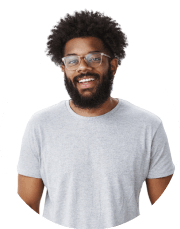
“There are other providers out there, I have tried 3. Gettested was the fastest and the customer service was the best. I even received my test on th...”
Alan

“Absolutely perfect, results came after few days and finally after a lots of times visited GP, we finally know why my son has eczema - he is allergy...”
E

“I found them to be professional and not too long a wait for results. Helpful with any after questions. Will be using them again if need be. I highl...”
Eileen

“I really value my test and to see the results. It is a jungle when your health is online. So get accurate and precise knowledge is a gift, as it is...”





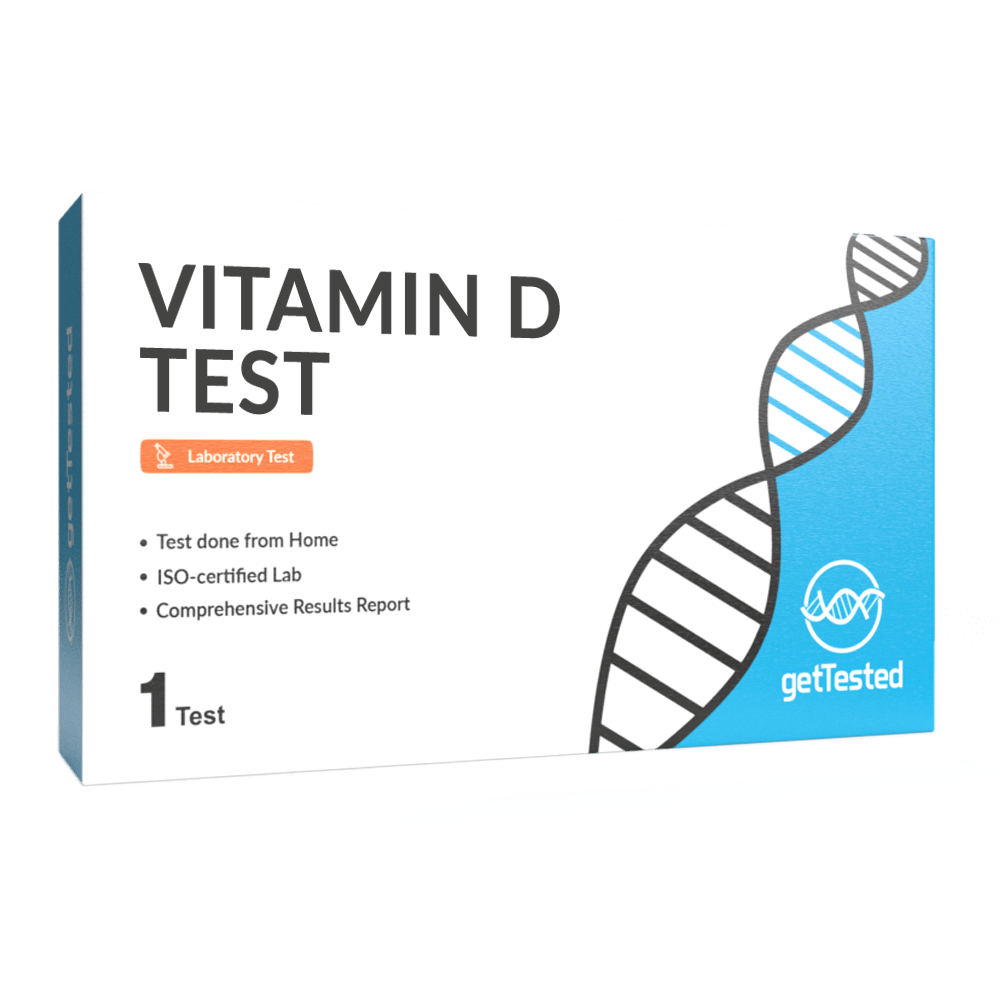
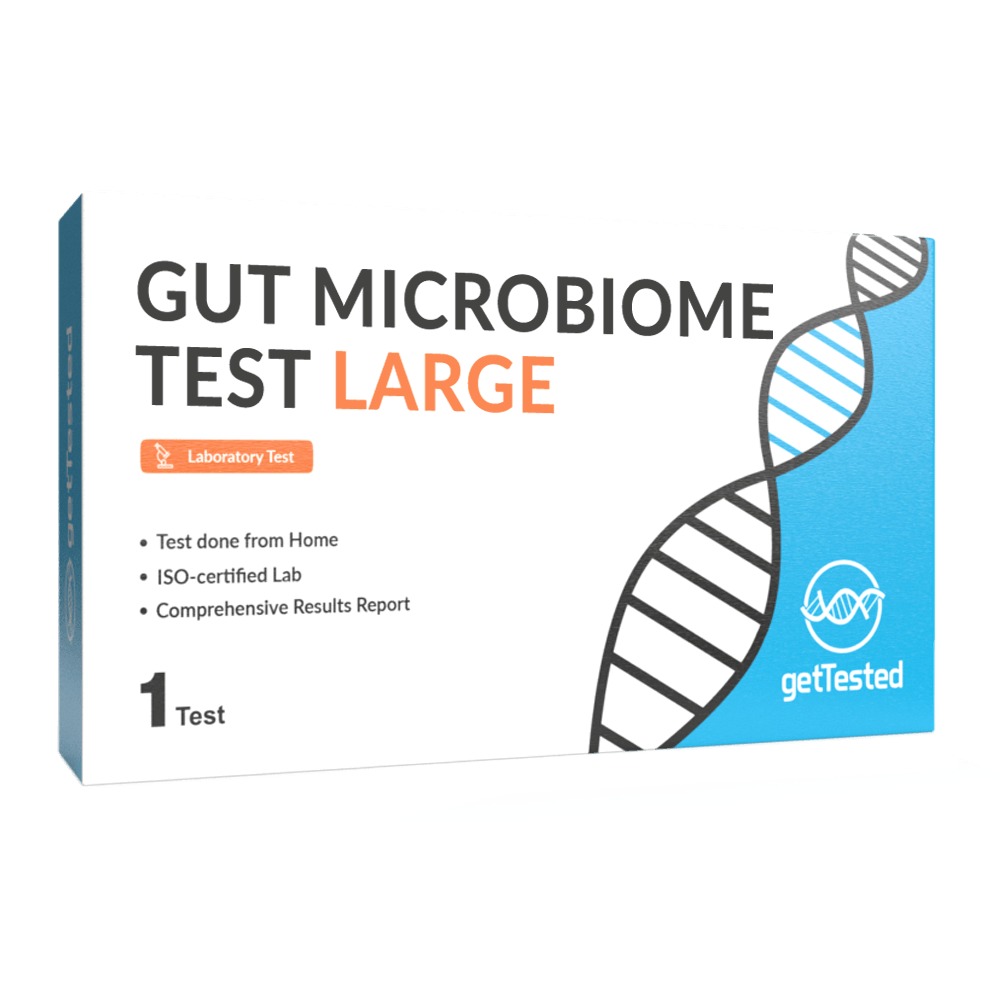
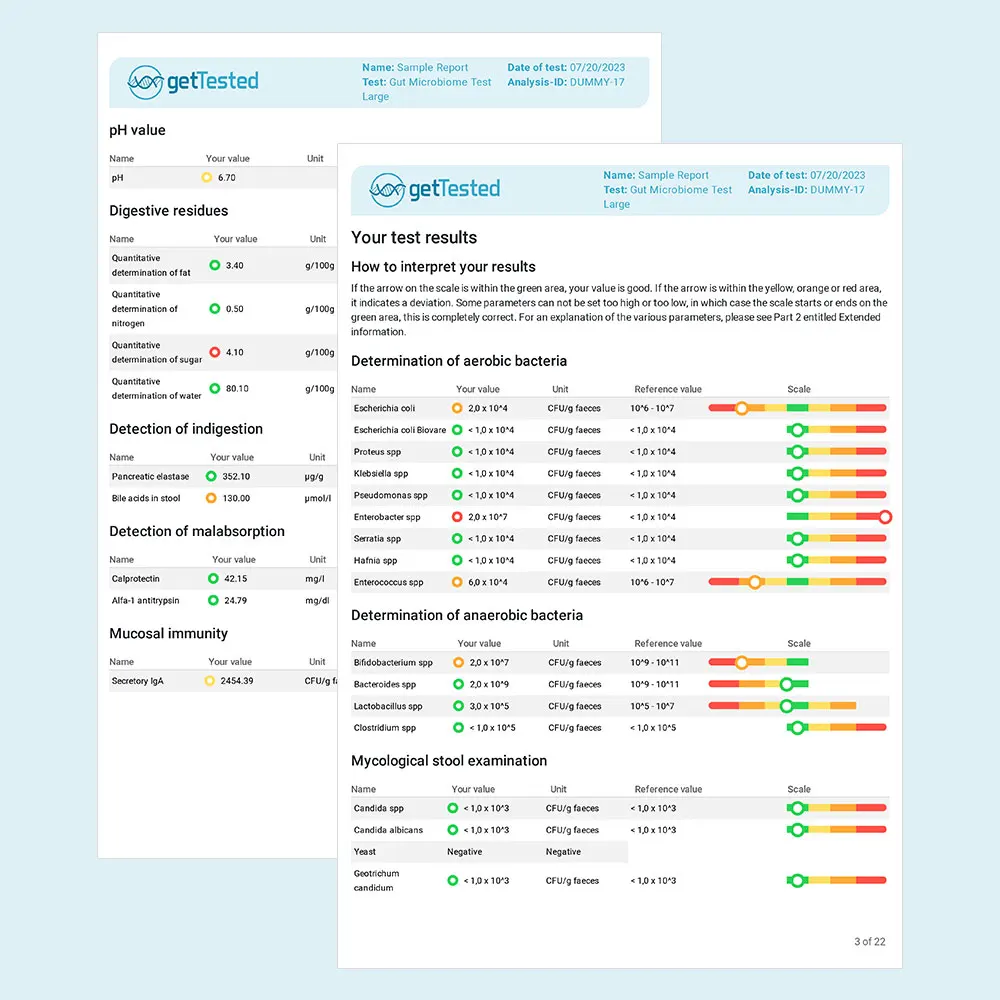

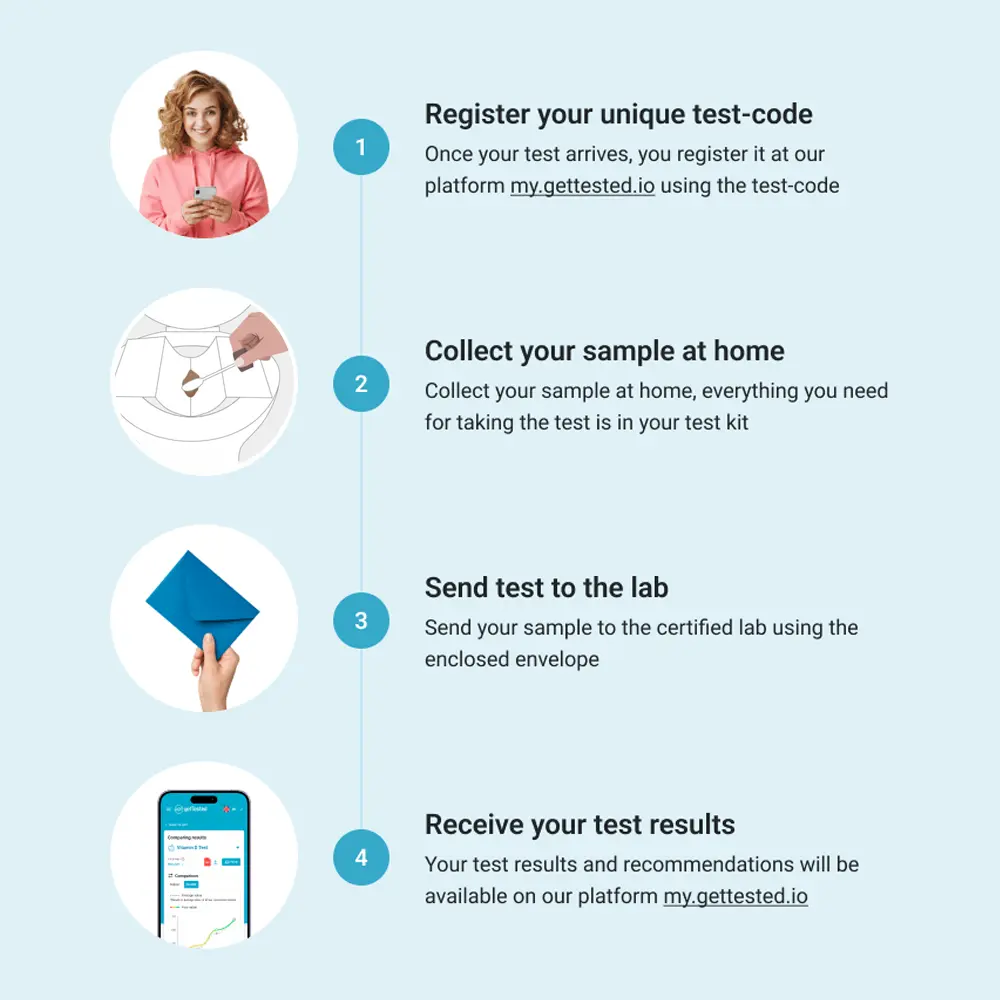
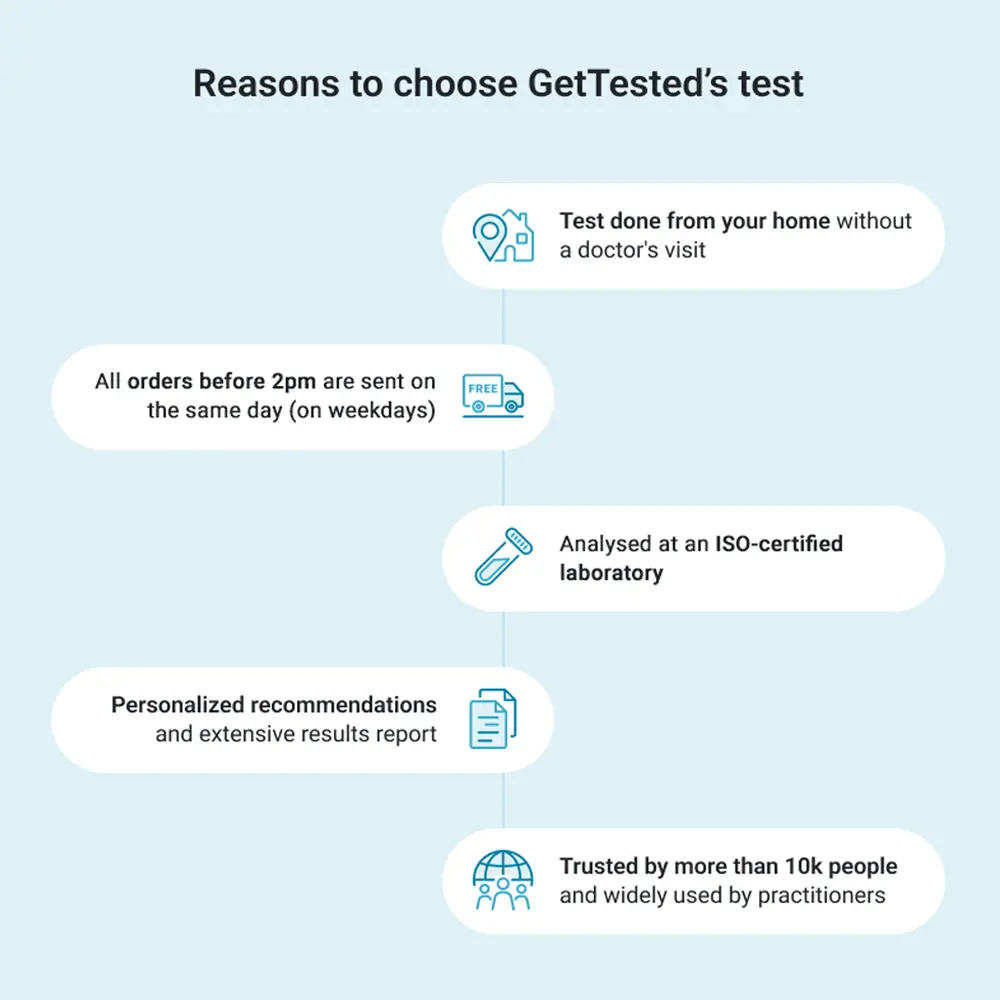
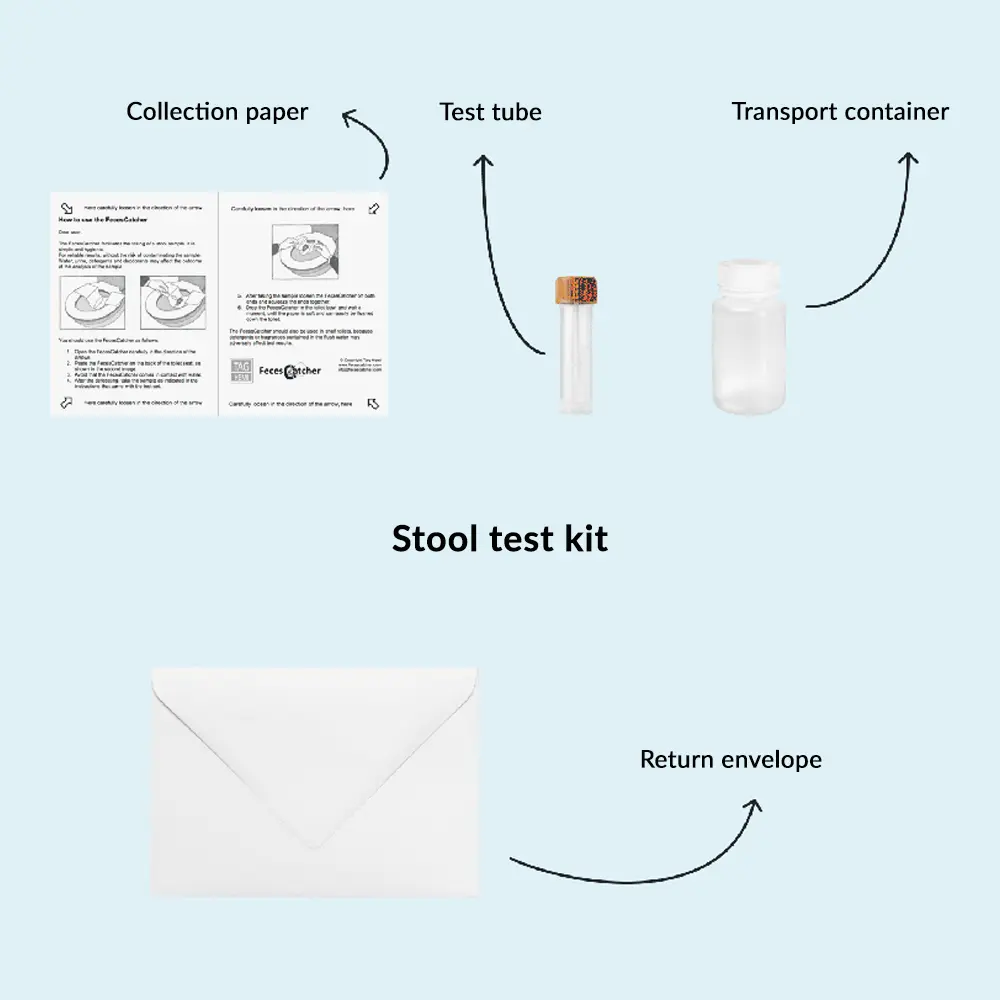


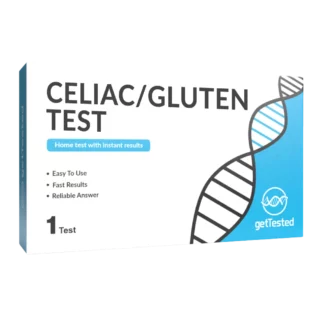
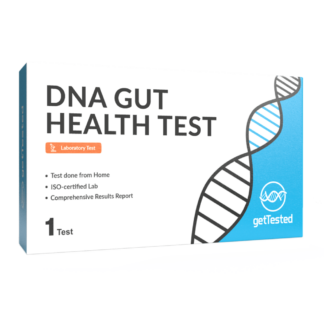
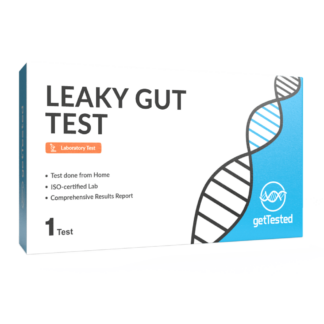
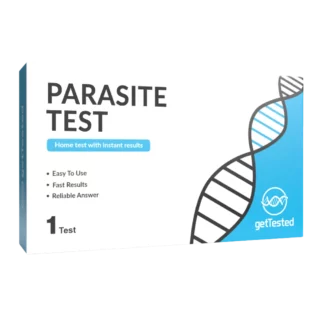
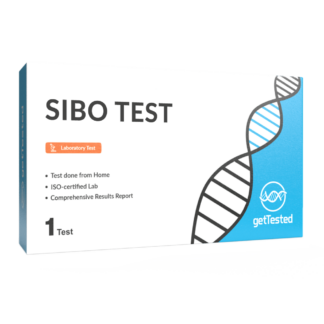
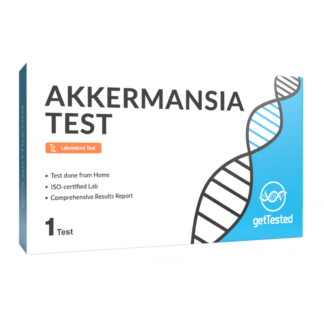
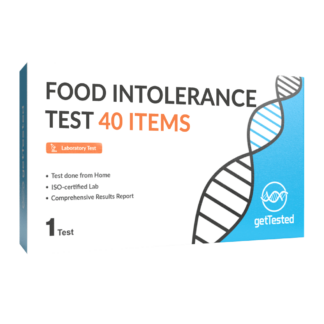
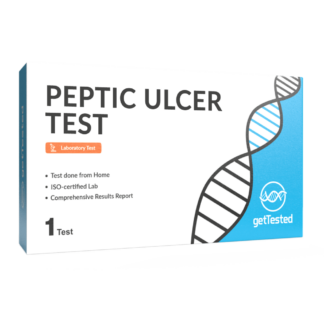
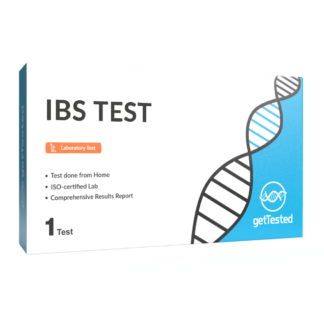












Leave a Reply